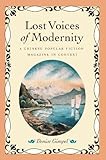Lost Voices of Modernity : A Chinese Popular Fiction Magazine in Context / Denise Gimpel.
Material type: TextPublisher: Honolulu : University of Hawaii Press, [2001]Copyright date: ©2001Description: 1 online resource (336 p.)Content type:
TextPublisher: Honolulu : University of Hawaii Press, [2001]Copyright date: ©2001Description: 1 online resource (336 p.)Content type: - 9780824863401
- 895.1/3509
- PL2303.G54 2001eb
- online - DeGruyter
| Item type | Current library | Call number | URL | Status | Notes | Barcode | |
|---|---|---|---|---|---|---|---|
 eBook
eBook
|
Biblioteca "Angelicum" Pont. Univ. S.Tommaso d'Aquino Nuvola online | online - DeGruyter (Browse shelf(Opens below)) | Online access | Not for loan (Accesso limitato) | Accesso per gli utenti autorizzati / Access for authorized users | (dgr)9780824863401 |
Browsing Biblioteca "Angelicum" Pont. Univ. S.Tommaso d'Aquino shelves, Shelving location: Nuvola online Close shelf browser (Hides shelf browser)

|

|

|

|

|

|

|
||
| online - DeGruyter Limits to Autocracy : From Sung Neo-Confucianism to a Doctrine of Political Rights / | online - DeGruyter Lords of Things : The Fashioning of the Siamese Monarchy's Modern Image / | online - DeGruyter Lost Leaves : Women Writers of Meiji Japan / | online - DeGruyter Lost Voices of Modernity : A Chinese Popular Fiction Magazine in Context / | online - DeGruyter Love of Mountains / | online - DeGruyter Loyal to the Land : The Legendary Parker Ranch, 750-1950, Aloha ʻĀina Paka / | online - DeGruyter Mad Wives and Island Dreams : Shimao Toshio and the Margins of Japanese Literature / |
Frontmatter -- Contents -- Acknowledgments -- Notes on conventions -- Introduction -- Chapter 1 A Modern Journal -- Chapter 2 Discussing Modern Questions -- Chapter 3 Fiction and Writing -- Chapter 4 A New Field of Activity -- Chapter 5 Literary History -- Afterword -- Appendix 1 Glossary of Chinese and Japanese Names and Terms -- Appendix 2 Alphabetical List of Contributors to Xiaoshuo yuebao, 1910–1914 -- Notes -- Bibliography -- Index
restricted access online access with authorization star
http://purl.org/coar/access_right/c_16ec
Lost Voices of Modernity uncovers the story of the most popular and perhaps the most maligned modern Chinese literary journal, Xiaoshuo yuebao (The Short Story Magazine). First published in Shanghai in 1910, Xiaoshuo yuebao boasted a circulation of ten thousand within its first three years of publication. Scholars have long characterized the journal as little more than superficial popular entertainment (primarily action/adventure and love stories) and attributed its early popularity to an urban audience's need for distraction and escape. Now, however, Denise Gimpel's persuasive and effective study reveals a journal of serious appearance and intent. By placing publication, contributions, and contributors within their specific cultural, social, and political contexts, Gimpel provides an astonishingly cogent picture of a reform-through-fiction project created and managed by a dedicated body of writers attempting to address the concerns of the day. Xiaoshuo yuebao informed the growing reading public of national and international issues, science, and foreign lands. Read in context, the stories, essays, plays, and poems published in its pages--largely in the form of the "new fiction" that had been hailed as the sociopolitical cure-all of the early twentieth century--constitute a panorama of the reforms being discussed at the time at all levels of public and private life.
Mode of access: Internet via World Wide Web.
In English.
Description based on online resource; title from PDF title page (publisher's Web site, viewed 02. Mrz 2022)


